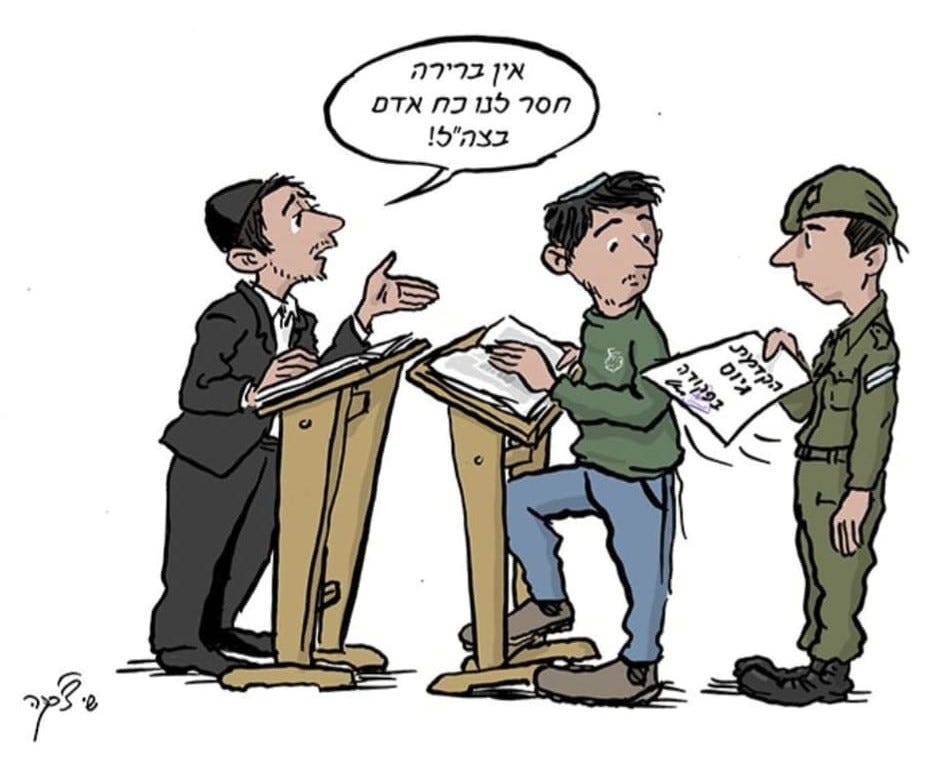The Growing Divide
The rift between charedim and the rest of Israel grows even worse
By their very nature, charedim have always separated themselves from the rest of Israel to a certain degree. But now that division is becoming an ever growing chasm.
Since the Hamas attack, there have been appalling losses. Over five hundred IDF soldiers have fallen in battle. Nearly twelve thousand have been wounded, of which nearly three thousand required hospitalization. Virtually none of these were from the charedi community.
Furthermore, there are countless people in the charedi community who don’t even know anyone who has been killed or wounded, and who haven’t been to any funerals or shiva houses or hospitals. For many people in the charedi community, the war isn’t even happening. The pain and anxiety felt by so many Israelis with family members in the IDF just does not exist in the charedi community.
Also since the war started, 287,000 reservists have been called up, leaving their families and businesses for several weeks to several months. Again, virtually none of these have been from the charedi community.
Then, due to all the losses and needs for additional manpower in light of Gaza and Hezbollah and Judea/Samaria, the IDF found itself with a manpower shortage. 1300 young men are being pulled out of yeshiva to make up the shortage. But again, they are only from Religious Zionist yeshivot, and none from charedi yeshivos.
And now, due to the manpower shortage, the IDF has announced that army service needs to be extended. Men’s service, which until now has been 28 to 32 months, will be extended to three full years. Female soldiers in certain roles will have their service extended from two years to three years. Again, virtually none of this higher price will be paid by the charedi community.
The duration of reserve duty will also be extended. Soldiers who currently serve 54 days over three years will instead serve 42 days every year. Commanders who serve 70 days over three years will now serve 48 days every year. And officers who serve 84 days over three years will now serve 55 days every year. Once more, virtually none of this higher price will be paid by the charedi community.
And finally, people will have to perform reserve duty until even later in life. Until now, reservist duty finished at ages 40, 45, and 49, depending on the role. But now, the IDF needs to extend service from age 40 to 45, from 45 to 50, and from 49 to 52. One special category of reservist volunteers would now be asked to continue up to age 66!
And, yet again, virtually none of this higher price will be paid by the charedi community.
It’s also clear that the claims at the beginning of the war about thousands and thousands of charedim joining the IDF were incorrect. Only a few hundred ended up joining, from the fringes of charedi society, for a few weeks of training in non-combat support roles.
Meanwhile, the economic costs of the war are enormous. But the charedi community is underemployed, continues to pay far less taxes and receives far greater welfare benefits, adding to the drain on the economy. Even during the war, the government allocated additional funding not only for regular charedi yeshivos, but even for “dropout” yeshivos whose only purpose is keep charedim out of the army.
This situation has become intolerable. The rift and resentment against charedi society is reaching unparalleled levels. It’s the inevitable consequence.
Some people claim that talking about this creates division and harms achdus. But that is false. Talking about this doesn’t create division; it reveals it. It doesn’t harm achdus; it exposes a lack of achdus that was created by the charedi community, which refuses to share a role in the national crisis.
But the problem is not just the unfairness and the rift in the nation. There are very real concerns for national security. Even with the additional service requirements, the IDF still needs thousands and thousands of additional soldiers. Meanwhile, many secular Israelis have a low birthrate and are unlikely to want to remain in a country where the burden of security is constantly increasing and one large growing sector of society remains exempt. Where are the soldiers that we need going to come from?
As Tehila Friedman asks of the charedi community in a searing article, what is the plan for the continued existence of the State of Israel?
Unfortunately there is not much hope for change. As discussed in an earlier post, charedim refuse to enlist for several reasons which are almost insurmountable. They’d rather go to prison and start a civil war than enlist. But, as discussed in another post, this does not mean that there is nothing we should try to do.
The main key, as usual, is money. Resources should be thrown at the few heroes in the charedi community who are trying to make change. And they should be withheld from those who refuse to share the national burden. On a national level, it should be made clear to politicians that it is politically toxic to have UTJ in the coalition and indulge their demands. On a communal and individual level, it must be made clear that charitable donations and other forms of support for institutions will only go to those who share in national responsibility. And whoever has a public voice should it make it clear that the charedi refusal to share the national defense and economic burden is wrong, intolerable and dangerous.
This is something that every single person must make an effort to influence. The survival of Israel is at stake.




The rift between charedim and the rest of Israel grows even better, not worse. If the non-Haredi electorate gets angry enough, the taboo on Arabs in the government will be replaced with a taboo in Haredim in the government.
That cartoon is amazing ;-)